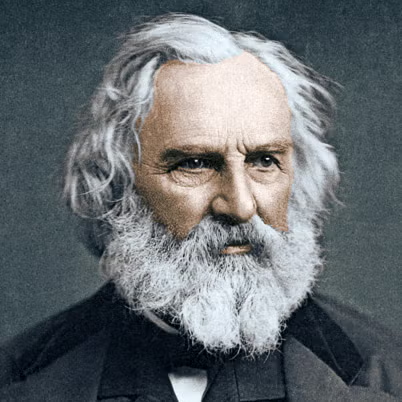
Table of Contents
Who Was Henry Wadsworth Longfellow?
Henry Wadsworth Longfellow was a renowned American poet, novelist, and scholar, who earned international acclaim for his literary contributions. A Harvard professor fluent in several European languages, Longfellow was deeply influenced by Romanticism and produced numerous notable works, including Hyperion, Evangeline, Poems on Slavery, and The Song of Hiawatha. He also gained recognition for his translation of Dante’s The Divine Comedy, further cementing his place as a literary giant of the 19th century.
Early Years
Born on February 27, 1807, in Portland, Maine, Longfellow hailed from a distinguished New England family. His father, a prominent lawyer, hoped that Henry would follow in his professional footsteps. However, after attending Portland Academy and Bowdoin College, where he was classmates with writer Nathaniel Hawthorne, Longfellow’s passion for languages and literature took center stage. Graduating in 1825, he was offered a teaching position at Bowdoin College with the condition that he first travel to Europe to deepen his knowledge of foreign languages. His travels sparked a lifelong fascination with European cultures and classical civilizations.
Upon returning to the United States, Longfellow faced the challenge of creating textbooks for the new and emerging field of foreign language studies. In addition to teaching, he published his first book, Outre-Mer: A Pilgrimage Beyond the Sea, a series of essays inspired by his European experiences. This work helped him secure a professorship at Harvard University in Cambridge, Massachusetts.
Prolific Writer
Longfellow’s literary career blossomed with the release of Voices of the Night, a collection of poems that included Hymn to the Night and A Psalm of Life. The success of this collection earned him widespread recognition. He followed this success with Ballads and Other Poems, featuring iconic pieces such as “The Wreck of the Hesperus” and “The Village Blacksmith.”
In addition to his writing, Longfellow was a full-time professor at Harvard, where he also led the Modern Languages Department. Despite budget cuts that left him to take on extra teaching duties, his popularity continued to soar, and he became a prolific writer, exploring diverse topics in his works. These ranged from slavery, as seen in Poems on Slavery, to European literature in The Poets and Poetry of Europe, and Native American culture in The Song of Hiawatha.
One of the early pioneers of literary self-promotion, Longfellow cultivated a vast audience, ultimately becoming one of the best-selling authors of his time. His legacy endures as a key figure in American literature, whose works continue to resonate with readers around the world.
Later Years and Death
In the final two decades of his life, Longfellow continued to enjoy widespread fame and recognition, receiving numerous honors both in Europe and America. His work garnered admiration from prominent figures such as Queen Victoria, Alfred, Lord Tennyson, Prime Minister William Gladstone, Walt Whitman, and Oscar Wilde.
However, Longfellow’s personal life was marked by further sorrow. In 1861, his wife, Fanny, tragically died in a house fire, the same year the United States was engulfed by the Civil War. His son, Charley, ran off to join the fight without his father’s approval. Devastated by his wife’s death, Longfellow threw himself into a significant literary endeavor: translating Dante’s The Divine Comedy, which was published in 1867.
In March 1882, Longfellow developed severe stomach pains, later diagnosed as acute peritonitis. Despite the use of opium to manage the pain and the presence of his friends and family, he succumbed to the illness on March 24, 1882. At the time of his death, he was one of the most celebrated writers in America, leaving behind an estate valued at approximately $356,000—a substantial sum for the era.
Personal Life
Longfellow first married Mary Storer Potter, a woman from a distinguished family. Before beginning his professorship at Harvard, the couple traveled to northern Europe. Tragically, Mary died in Germany in 1836 following complications from a miscarriage. Deeply grief-stricken, Longfellow returned to the United States and sought refuge in his writing. He soon published the romance novel Hyperion, which revealed his unrequited love for Frances Appleton, whom he had met in Europe after Mary’s death. Seven years later, in 1843, Longfellow and Frances married, and together they had six children.
